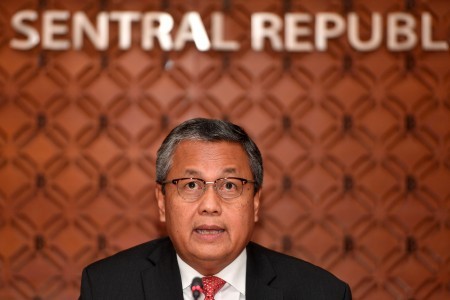Rate hike surprise
The rate increase, the third in six weeks, also reinforced the central bank’s politically independent stance.
Change Size
 Bank Indonesia Governor Perry Warjiyo (Antara/Sigid Kurniawan)
Bank Indonesia Governor Perry Warjiyo (Antara/Sigid Kurniawan)
B
ank Indonesia’s (BI) “surprise” decision on Friday to raise its benchmark rates by 50 basis points (bps) to 5.25 percent — double the increase most economists expected in view of subdued inflation and continued weak economic growth — sent a strong message to the market that macroeconomic stability came first in its monetary policy.
The rate increase, the third in six weeks, also reinforced the central bank’s politically independent stance.
Though President Joko “Jokowi” Widodo may not agree to a tighter monetary policy ahead of next April’s presidential election, we are confident that Finance Minister Sri Mulyani Indrawati fully endorses the monetary measure, despite its dampening effect on economic growth. A little comforting, though, is the central bank’s measure to sweeten the policy by relaxing the loan-to-value (LTV) ratio.
Indeed, given the lingering trade war between the world’s largest (United States) and second largest (China) economies, with the attendant negative repercussions on the rest of the world, and the steady rise in the US Federal Reserve rate, the risk of capital outflows has only increased, since foreign investors hold about 40 percent of all government bonds. And in the first six months alone, the rupiah depreciated by 5 percent
As a result of benign inflation, Indonesia’s real rates (at both the short and long ends) and the real rate differentials against the US are much higher now than they were during the taper tantrum (in mid-2013, at the start of the Fed’s tapering policy), when BI was forced to raise its policy rate by 175 bps to as high as 7.50 percent in the second semester to defend the rupiah.
As the overall condition of the Indonesian economy is considerably sound, we believe BI Governor Perry Warjiyo rightly described the central bank’s monetary measures as “preemptive, front-loading and ahead-of-the-curve moves to strengthen stability, especially exchange rate stability against a higher than expected US Fed Fund Rate [FFR] hike and increasing risk in the global financial market”.
Since the country depends heavily on imports for over 60 percent of its fuel needs and spends tens of billions of dollars annually on importing food commodities and other consumer goods, a higher rate of rupiah depreciation would stoke inflation and consequently unleash downward pressures on the currency to set off a vicious economic cycle.
The central bank does realize that rate hikes alone will not drive the rupiah’s value. But the rate increase is the right and most readily available tool for having the quickest impact. The tightening measure will not be sustainable for the medium term without accelerated structural reform in various economic sectors, notably those that influence the export industry. Prudent fiscal management should also be strengthened amid the strong temptation for the government to distribute political goodies in an election year.
We are confident that, as the government (fiscal authority), the central bank, the Financial Services Authority (OJK) and the Indonesia Deposit Insurance Corporation (IDIC) continue to increase coordination to maintain economic stability and growth sustainability, the financial system will be able to pass through the upcoming market turbulence.








